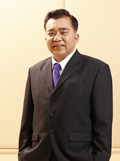The chief of Thailand's Government Pharmaceutical Office (GPO) said legislation afoot that would lead to a halt in making state hospitals spend at least 60% of their medicine budgets on its products is a bad idea on costs alone--but also because the state manufacturer lacks in-house marketing and sales expertise.
 |
| Nopporn Cheanklin |
Instead, ahead of an October timeline for a new law procurement for state agencies due to take effect in October, GPO executive managing director Nopporn Cheanklin wants at least a 5 year phase-in period.
"Every year we help the country save about 4 billion baht ($114 million) in money that would have otherwise be spent on imported medicines," Cheanklin told the Nation newspaper in an interview. "This is just one of the reasons why we should be given time to adjust."
He added that GPO staff have no experience in marketing and incentive management strategies, the Nation said, and would be at the mercy of foreign firms that understand the market better.
Thailand has three insurance health schemes with a premier class for civil servants that has drawn the ire of other citizens and prompted the military-backed government of Prime Minister Prayut Chan-o-cha to focus on costs for many generic drugs.
In May, Thailand's efforts to rein in the cost of drugs and medical treatment faced a pushback by the country's private hospitals. The head of the Private Hospitals Association, Chalerm Hanpanich, said public hospitals do not bear the infrastructure costs. But a National Legislative Assembly subcommittee with jurisdiction on medical pricing found that influenza treatments at private Thailand hospitals cost one-third more than at public hospitals.
The GPO has been a key player in that effort and earlier ones, including issuing compulsory licenses for Merck's ($MRK) HIV/AIDS drug efavirenz in 2006 and attempting the same for blood thinner clopidogrel under a compulsory license issued for Sanofi's ($SNY) Plavix in 2012 as demand soared in Thailand for newer treatments that were either costly or not yet available.
Cheanklin added to the Nation that the GPO was a major supplier to the National Health Security Office and its universal healthcare scheme, the widest of the three covering as many as 49 million Thais.
The two other programs are the social security scheme and the healthcare benefit scheme for civil servants and their family members.
At its core, Cheanklin told the newspaper, the legislation is an assurance of low-cost drugs at public hospitals under a law that charges it with health security, including the right in an emergency to manufacture a needed drug even if it has not been registered by Thailand's Food and Drug Administration. In that light he said, the GPO needed more room to work out a new plan.
"We can adjust but we will need time," he told the Nation.
Among competition may be regional players like Indonesia's top drugmaker, Kalbe Farma, which said in May, Reuters reported, it was looking to expand to Singapore and Thailand and their over-the-counter drug markets as a regional trade pact looks set to start at the end of the year.
The regional push is of interest ahead of an economic union on the Association of Southeast Asian Nations (ASEAN) at the end of 2015 that holds the promise of gradual harmonization on regulatory approvals in the trade bloc and related moves to protect intellectual property.
Kalbe has already expanded into Myanmar, the Philippines and Vietnam, but those markets account for only 5% of overall sales.
- here's the story from The Nation